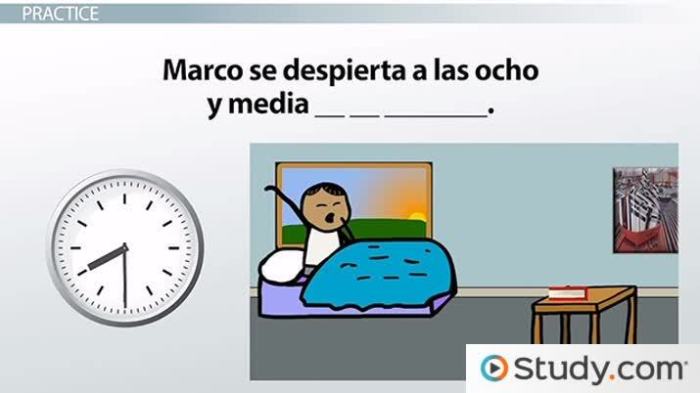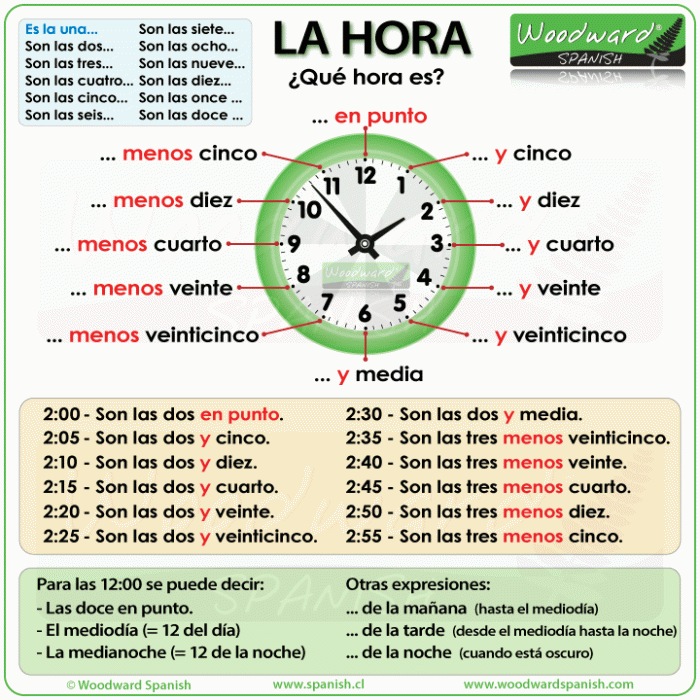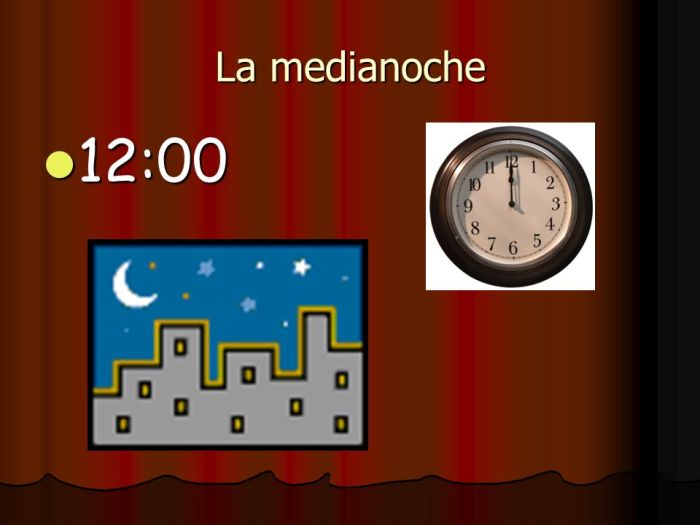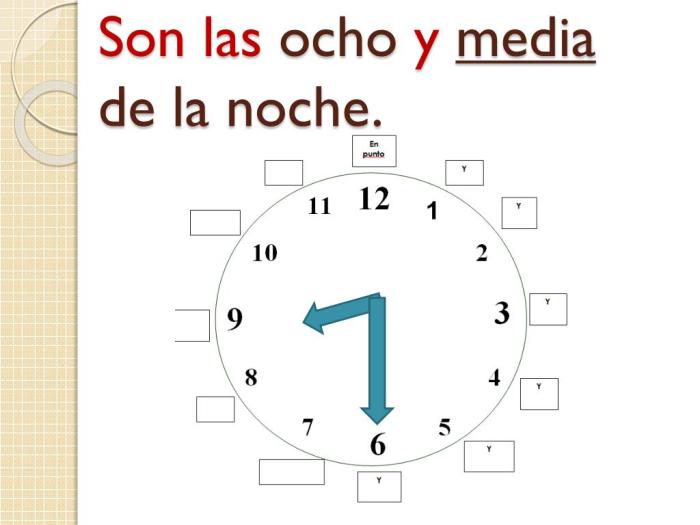Ser/ ocho y media/ noche – At the heart of Spanish culture lies a phrase that captures a moment both ordinary and profound: “Ser/ocho y media/noche.” This enigmatic expression, meaning “It’s eight-thirty at night,” resonates deeply with Spanish speakers, evoking a rich tapestry of traditions, values, and social norms.
As we delve into the origins, cultural implications, and artistic expressions surrounding “ser/ocho y media/noche,” we will uncover its profound influence on the Spanish language and its enduring significance in contemporary society.
“Ser/ocho y media/noche”: Ser/ Ocho Y Media/ Noche
The phrase “ser/ocho y media/noche” literally translates to “it is/eight-thirty/night” in English. In Spanish culture, this phrase has a specific meaning and significance that goes beyond the literal time of 8:30 pm.
In Spain, “ser/ocho y media/noche” is often used to refer to the time when people typically have dinner. This is because the traditional Spanish mealtimes are later than in many other countries. Lunch is typically eaten between 2:00 and 4:00 pm, and dinner is not usually served until 9:00 or 10:00 pm.
As a result, “ser/ocho y media/noche” has come to be associated with the time when people start to think about preparing or eating dinner.
Examples
- “¿Qué vas a hacer esta noche?”
- “Voy a cenar con unos amigos.”
- “¿A qué hora?”
- “A las ocho y media.”
In this example, the speaker is asking what someone is doing that night. The person responds that they are going to have dinner with friends at 8:30 pm.
- “¿Tienes hambre?”
- “Sí, un poco. Son las ocho y media y no he cenado.”
In this example, the speaker is asking if someone is hungry. The person responds that they are a little hungry because it is 8:30 pm and they have not had dinner yet.
Historical Origins

The phrase “ser/ocho y media/noche” (it is eight-thirty at night) has a long and rich history in the Spanish language. Its origins can be traced back to the Middle Ages, when it was used to describe the time of day when the sun set.
Over time, the phrase evolved to be used more generally to refer to the evening hours.
Evolution of Usage
In the 16th century, the phrase “ser/ocho y media/noche” began to be used in a more specific sense to refer to the time of day when people would typically go to bed. This usage of the phrase is still common today, and it is often used to describe the time when children are put to bed.The
phrase “ser/ocho y media/noche” has also been used in a number of literary works. In the 17th century, the Spanish playwright Lope de Vega used the phrase in his play “El perro del hortelano” (The Dog in the Manger). In the 19th century, the Spanish poet Gustavo Adolfo Bécquer used the phrase in his poem “Rima XII” (Rhyme XII).The
phrase “ser/ocho y media/noche” is a deeply ingrained part of the Spanish language and culture. It is a phrase that has been used for centuries to describe the time of day when people typically go to bed. The phrase has also been used in a number of literary works, and it continues to be used today in both formal and informal settings.
Cultural Implications

The phrase “ser/ocho y media/noche” carries significant cultural implications in Spanish-speaking societies. It reflects deep-rooted values, traditions, and social norms that have shaped the way people perceive time, punctuality, and social interactions.
One of the key cultural implications of the phrase is the emphasis on punctuality and respect for time. In many Spanish-speaking cultures, arriving on time for appointments, meetings, or social events is considered a sign of respect and good manners.
The phrase “ser/ocho y media/noche” serves as a reminder of the importance of being punctual and not keeping others waiting.
Ser las ocho y media de la noche puede ser un momento perfecto para relajarse y prepararse para el día siguiente. Para los estudiantes de enfermería, puede ser un momento para revisar los conceptos médicos esenciales. El banco de pruebas de Lewis Med Surg ofrece una amplia gama de recursos para ayudar a los estudiantes a prepararse para sus exámenes.
Después de estudiar, pueden relajarse y disfrutar de las horas restantes de la noche.
Punctuality and Respect for Time, Ser/ ocho y media/ noche
- Punctuality is highly valued in Spanish-speaking cultures, and arriving on time is seen as a sign of respect.
- The phrase “ser/ocho y media/noche” emphasizes the importance of being on time and not keeping others waiting.
- Being late is generally considered rude and disrespectful, and may be seen as a sign of disorganization or lack of consideration.
Regional Variations

The phrase “ser/ocho y media/noche” exhibits regional variations in its usage and connotation within the Spanish-speaking world.
In some regions, such as Spain and Mexico, the phrase is commonly used to refer to the time of 8:30 p.m. However, in other regions, such as Argentina and Uruguay, the phrase may be used to refer to the time of 9:30 p.m.
Spain and Mexico
In Spain and Mexico, the phrase “ser/ocho y media/noche” is typically understood to mean 8:30 p.m. This is because the 24-hour clock is widely used in these countries, and 8:30 p.m. is represented as “20:30” in this format.
Argentina and Uruguay
In Argentina and Uruguay, the phrase “ser/ocho y media/noche” is often used to refer to the time of 9:30 p.m. This is because the 12-hour clock is more commonly used in these countries, and 9:30 p.m. is represented as “9:30 p.m.”
in this format.
Literary and Artistic Expressions

The phrase “ser/ocho y media/noche” has been a source of inspiration for numerous literary and artistic works. In literature, the phrase often evokes a sense of mystery and intrigue, as it suggests a time when the world is both familiar and strange.
Poetry
In poetry, the phrase has been used to create a sense of anticipation and suspense. For example, in the poem “Ocho y Media” by Federico García Lorca, the phrase is repeated throughout the poem, creating a sense of urgency and unease.
The poem describes a woman who is waiting for her lover, and the phrase “ocho y media” becomes a symbol of her longing and anticipation.
Comparative Analysis

The phrase “ser/ocho y media/noche” is not unique to Spanish culture. Similar phrases and expressions exist in other languages and cultures, each carrying its own nuances and cultural implications.
In English, for instance, the phrase “it’s half past eight at night” serves a similar purpose. It indicates a specific time, but it also carries a sense of the evening’s progression. The use of “night” instead of “evening” suggests that the time is late, and it may be time to wind down or prepare for bed.
Usage and Cultural Implications
One of the key differences between “ser/ocho y media/noche” and its English counterpart is the way it is used in conversation. In Spanish, it is common to use the phrase as a greeting or a way to acknowledge the time.
For example, if you meet someone in the evening, you might say “Buenas noches, son las ocho y media” (“Good evening, it’s half past eight”). This usage reflects the importance of time in Spanish culture and the value placed on punctuality.
In English, on the other hand, it is less common to use the phrase “it’s half past eight at night” as a greeting. Instead, it is more likely to be used to state the time or to indicate that something is happening at that time.
For example, you might say “The movie starts at half past eight at night” or “I’m meeting my friends at half past eight at night.” This difference in usage reflects the different cultural values placed on time in English and Spanish cultures.
FAQ Summary
What is the literal meaning of “ser/ocho y media/noche”?
It means “It’s eight-thirty at night.”
How is the phrase “ser/ocho y media/noche” used in everyday conversations?
It can be used to indicate the time, to make plans, or to express a sense of urgency or anticipation.
What are some regional variations in the usage of the phrase “ser/ocho y media/noche”?
In some regions, it may be used to refer to a specific time, while in others it may be used more generally to indicate the evening.